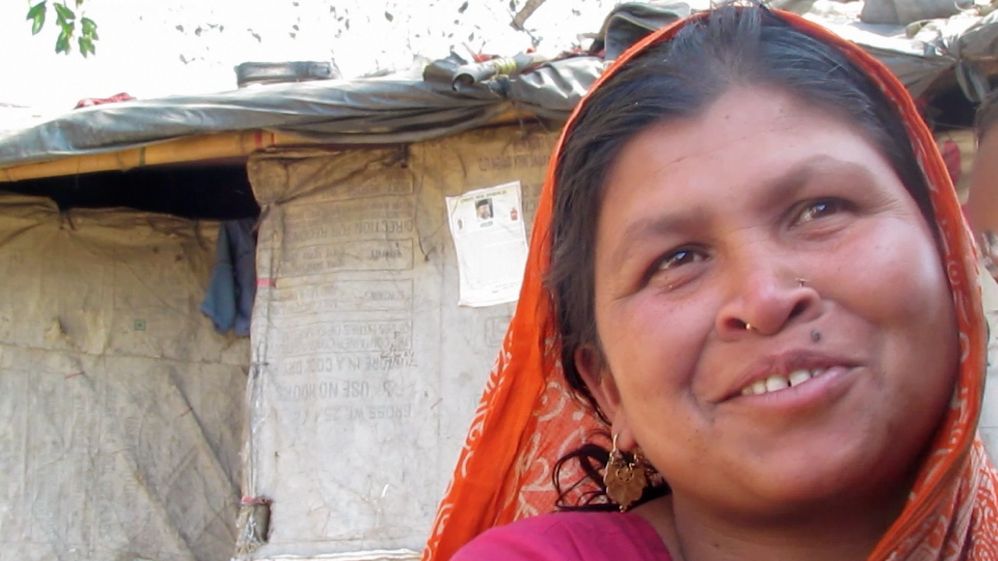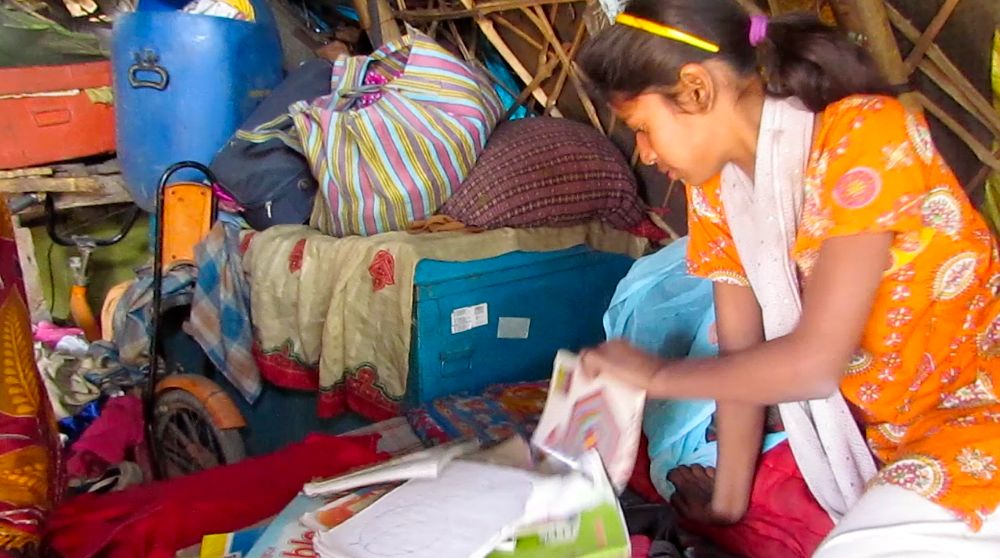This article is the final installment in a series that follows the lives of four Assamese Muslim refugees currently living in a slum in the Rahimnagar section of Lucknow, India. Having fled religious persecution, three of the women make their living as domestic workers, and one works as a rag-picker. Vaidehi Joshi originally reported their stories in her short Urdu film entitled “Lucknow’s Refugees,” now available with English subtitles.

After two hours of sitting in this dusty courtyard, I begin to resent the midday sun beating down on my back. Zaheda, who squats beside me, insists that I speak with one of her close friends. She beckons to a woman nearby. When the woman sits down, I immediately understand why Zaheda wanted me to talk to her.
With her wide grin and infectious laugh, she is unlike any of the other women I have met in Rahimnagar. Her wide eyes twinkle every time she giggles. Joking and teasing the people around us, she shows no signs of hesitation when it comes to speaking with me. She hoists her wide-eyed daughter into her lap, and coos when her daughter tugs at her bright, orange sari. She introduces herself with a smile. “My name is Zahoora.”
Zahoora escaped from Assam 12 years ago. She and her husband sought refuge in in Rahimnagar, where they now live with their five sons and two daughters. Just like the other women in this slum, Zahoora also works as a maid in neighboring houses.
However, of the four women I interview, she is the only one who has continued to return to Assam. Once every four or five years, Zahoora visits her mother in her homeland. Each time she returns, the situation seems to have gotten worse.
“Things there are so bad,” she says. “There is so much flooding in Assam that we can’t plow our fields.”
As Zahoora tells me about her family back home, the conversation inevitably turns to the topic of ethnic violence carried out by the Bodo tribespeople. “They [the Bodo] burn our fields, and then everyone runs away. Then, in the night, they loot our crops. They take our rice, lentils and wheat. They take everything,” she explains, describing the terror tactics used by the tribe. “The Bodo trouble us a lot. That’s why we fled from Assam. That’s why we’re here in Lucknow.”
But things in Lucknow are by no means easy. When Zahoora tells me that her rent is 1000 rupees (close to $20.00) per month for her house, I am floored. She motions to her house at the end of the lane behind me, pointing out a small hut with its door halfway open. Her house is barely 25 square feet.
Zahoora explains that she cannot pay her rent on her salary alone. Her children have to work to help make ends meet. “My children work. They collect trash. They don’t study. They sweep and mop, but they don’t study.”
On top of her steep rent, Zahoora is forced to pay bribes to the local Lucknow police. “‘Get out of here, or else we’ll tell them about you!’” Zahoora says, imitating the actions of the infamous khaki-clad Indian police. “We have to give them 100 rupees to leave us alone. If you give them 100 rupees, they’ll let you work. If you don’t give it to them, they’ll never let you work. They stand at the intersection with their sticks. They won’t let you leave here if you don’t give them money.”
Zahoora tells me that many women are terrified of the police, and sometimes even skip work if they see police on duty at the Rahimnagar intersection. She explains that they are afraid of being sent back to Assam, where as women, they have fewer career options — if any.
Despite the corruption and exploitation, Zahoora is happy to make her home in Lucknow. “This is better than Assam,” she says frankly. “Here, they take rent from you — which is fair. We all work all day long to collect enough money to pay it. Women are allowed to work, children can work, and no one bothers you,” she describes.
By the time Zahoora and I finish talking, it’s almost evening. As we walk back through the narrow lanes, Zaheda asks me to follow her to her house — a tiny hut constructed of bamboo and plastic tarp. “Come, come,” Zaheda says, inviting me into her home. “I’ve ordered chai from a hotel for you,” she says, smiling.

The sun still finds its way inside the house. Beams of light pierce the yellow tarp walls. I sit on the charpoy, a bed constructed from a wooden frame and woven together with rope. Surrounding me are trunks, cloth bags, and plastic containers, piled on top of one another. Inside of them are papers, books, and clothes.
Zaheda’s daughter, Yasmeen, sits beside me and pulls out a few schoolbooks from a dusty red backpack shoved under the bed. One particular textbook she hands me describes the different parts of a computer, which this girl has never used herself.
Suddenly, Zaheda turns to me and looks me in the eye. “Why did you want to talk to me?”
I tell her about the two maids from Zaheda’s neighborhood that work in our compound. I explain that,even though the maids and I speak two entirely different languages, we have developed a friendship. I explain my desire to share these women’s stories — despite the language barrier. “I like ot think if more people knew the stories of refugees like you,” I tell her, “ They would, at the very least, treat you with more respect.”
At this, Zaheda stands up and reappears with a two small plastic cups filled with chai. As is tradition in this part of north India, she offers me a few crackers as the namkeen, or salty snack, to accompany the sweet chai.
After a few sips, Zaheda says that she is glad that I came here to talk to all of these women. She hopes that people will better understand why they are here. “I am glad you are helping me tell the story of my people,” she says in Urdu.
In India, there is a famous Hindi saying “Kisi ka namak khana.” Literally translated, it means, “Eating someone’s salt.” But its figurative meaning is being indebted to someone. When you consume someone’s salt, you forge a special bond with that person. Essentially, you are indebted to them.
As I bite down on the namkeen that Zaheda has offered me, I can’t help but remember this phrase. I realize then that I am not the one who is helping Zaheda. Rather, she is helping me.
Zaheda introduced me to awe-inspiring women like Shahida, Amna, and Zahoora. She also told me her story, even though I was a complete stranger. Her courage taught me the power of using the voice that I have been given.
Indeed, Zaheda opened my eyes in so many ways. And for that, I will always be indebted to her.
***
You can watch Vaidehi Joshi’s short documentary “Lucknow’s Refugees” below. Click here to read the previous parts of this series.
http://youtu.be/EtgYW6wlyZ0
Vaidehi Joshi is 23, and lives in Richmond, Virginia. She studied English at Barnard College in New York City and will be joining the movement to end educational inequity as a 2013 Teach for India fellow in Mumbai. You can see more of her work on her website or follow her on Twitter @vaidehijoshi.












